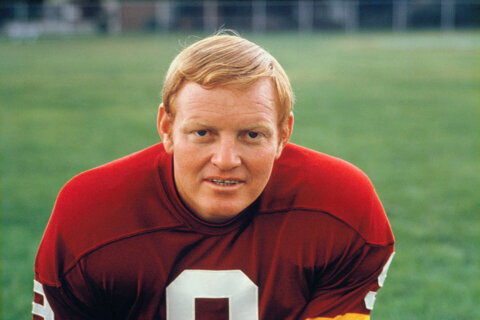WASHINGTON — When I saw the San Francisco 49ers deal a 2018 second-round pick to New England for promising Patriots backup quarterback Jimmy Garoppolo, I immediately thought of the Kirk Cousins situation here with the Washington Redskins. “The ‘Skins finally caught a break in a situation they botched from the beginning,” I thought.
Why, you ask? Because the Redskins just got some leverage back. Cousins has been in the driver’s seat almost from the beginning of his contract negotiation with the team, especially when you consider two of his former offensive coordinators are serving as head coaches in the NFC West: Kyle Shanahan in San Francisco and Sean McVay with the Los Angeles Rams.
However, those two options appear to have closed as quickly as they opened up. McVay’s golden touch that turned Cousins into a productive starter has also made second-year QB Jared Goff look more like the No. 1 overall pick he was a year ago than the instant bust he appeared to be his rookie season. Shanahan has had no such luck with veteran re-tread Brian Hoyer or third-round desperation play C.J. Beathard. but Garoppolo represents a far better option — one that would have to crash and burn really hard for the Niners to cut bait on him in the off-season, given the level of investment.
(Brief digression: Just imagine if the Redskins were, say, 1-6 right now. What are the odds that the ‘Skins would have dealt Cousins to the 49ers before the Garoppolo deal just to get maximum return on his value and ensure they stay on track to draft a suitable replacement? It’s definitely a fascinating hypothetical.)
But don’t get it twisted: This doesn’t mean Captain Kirk won’t have other suitors. So far, he’s the third-rated passer in the league at 103.3 (behind only Alex Smith and Tom Brady), and his 13-to-4 TD/INT ratio is among the league’s best. Cousins is playing well on a team with cripplingly injured offensive line and no help from the run game. He’s obviously not elite but he is a smart, coachable player who’s plenty good enough to have teams falling over each other to pay him lots and lots of money to be the face of their franchise.
Jacksonville would probably be at the front of that line. Blake Bortles is the obvious (and, arguably, only) weak link on an otherwise really good Jaguars squad that boasts quality receiving targets, a great young running back in Leonard Fournette, and a nasty, potentially dominant defense. Cousins could put the Jags over the top in a competitive division, and they could afford him by simply cutting Bortles (which would clear $19 million in 2018 cap space).
Minnesota would be the next best landing spot for Cousins. The Vikings also have plenty of cap space, a great defense, a run game driven by a 2017 rookie phenom (though Dalvin Cook is currently rehabbing a season-ending knee injury), and have some nice weapons, such as former Terp wideout Stefon Diggs. Cousins would make a lot more sense to the Vikings than injury-prone incumbents Sam Bradford and Teddy Bridgewater, both of whom come off the books in 2018.
Denver is an intriguing option. They’re already $13 million under next year’s cap and offer the same benefits as Jacksonville and Minnesota: Strong defense, a good ground game, and quality targets to throw to. However, the Broncos’ offensive line has struggled in recent years and GM John Elway’s arrogance toward spending money on the position he used to play in Denver has basically doomed the team to lackluster results from guys, such as Trevor Siemian and Brock Osweiler (again).
The Cardinals may be an outside option thanks to money (they’re already $25 million under next year’s cap), and the presence of dual threat RB David Johnson and quarterback whisperer Bruce Arians. But that’s a team rapidly getting old — Larry Fitzgerald is 34, and the 65-year-old Arians may not be in Arizona much longer — and there’s no guarantee the inevitable youth movement will yield enticing results.
But those are just the logical options. As of now, the New York Jets have the second most available 2018 cap space of any team in the league. So, if any undesirable team has the money to make Cousins sit up and pay attention to an otherwise uninteresting situation, it’s the Jets. But the Redskins already have $49.9 million free in 2018, so money isn’t an excuse for them to not make a deal.
Just to be clear, none of what happened at the trade deadline necessarily makes Cousins more or less likely to stay in Washington. But it did turn his ultimate decision into a very cut-and-dried choice between the continuity the Redskins offer and a fresh start elsewhere, without the comfort of a familiar fallback.








